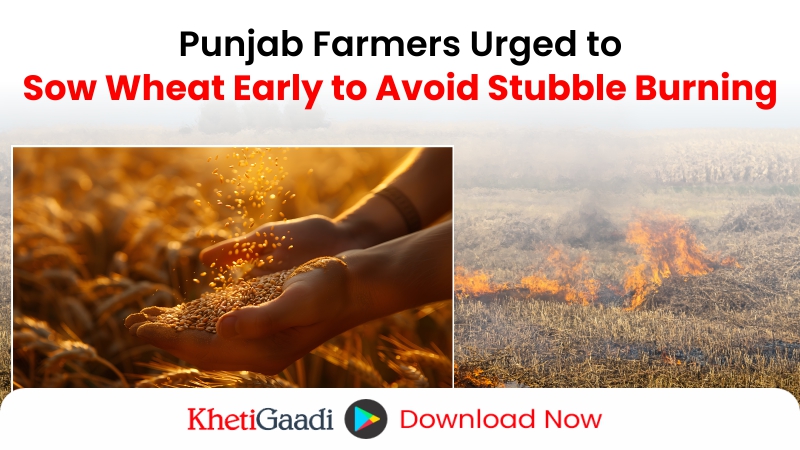As paddy harvesting begins in Punjab, farmers are being advised to start sowing wheat between November 1 and 15 to avoid the need for stubble burning, a practice that significantly contributes to pollution in Punjab and Delhi-NCR. Experts warn that a delay in paddy harvesting leaves farmers with limited time to prepare their fields, often leading them to burn crop residue in haste, further worsening the region’s air quality.
KhetiGaadi always provides right tractor information
Stubble Burning: A Growing Concern
Dr. Baldev Singh Naurat, former director of the Punjab Seed Certification Authority, has expressed concern over the increasing incidents of stubble burning, particularly as the wheat sowing season approaches. Stubble burning is a quick method for clearing fields, but it comes with harmful environmental consequences. The pollution it generates not only affects Punjab but also contributes to the severe air quality problems in Delhi-NCR.
According to reports, the state has already seen 123 cases of stubble burning this season, the highest recorded so far, raising alarms about worsening air pollution. Experts are urging farmers to adopt alternative methods for managing paddy residue to prevent further environmental degradation.
If you wish to know organic methods to increase your overall cultivation yield, please call KhetiGaadi counsellor on 07875114466 or write an email to connect@khetigaadi.com
Time Crunch: The Root of the Problem
The root cause of stubble burning lies in the short window between paddy harvesting and wheat sowing. The ideal period for sowing wheat in Punjab is between November 1 and 15, according to agricultural experts. However, when paddy harvesting is delayed—especially beyond mid-October—farmers face time constraints, leaving them with little choice but to burn stubble to quickly prepare their fields for wheat.
Former IAS officer and chairman of the Punjab Pollution Control Board, Kahn Singh Pannu, highlighted the dangers of such delays, especially for short-duration paddy varieties like PR-126. These crops, which ripen in about 120 days, are at risk of losing yield if not harvested promptly. “If the standing crop is not harvested soon, the grains will start falling, which will affect the yield,” said Pannu.
Maize Cultivation Adds to the Challenge
Adding to the complexity is the growing area under maize cultivation in Punjab. Dr. Naurat pointed out that maize is now being grown on more than 1.5 lakh hectares, a significant increase over previous years. Maize, which is typically sown in April or May, requires heavy irrigation and is harvested by late October or early November, creating a narrow window for farmers to plant paddy and then prepare for wheat sowing.
This extended crop cycle, particularly for maize farmers who plant paddy after maize, often leads to delays in the paddy harvest, further pressuring farmers to resort to stubble burning.
Call for Streamlined Procurement
Pannu also emphasized the need for the government to streamline the procurement process in mandis (agricultural markets) to help farmers sell their harvested crops faster. Delays in selling the crop often mean farmers are left with even less time to prepare for wheat sowing. “The government must ensure that farmers can quickly sell their paddy so they can immediately prepare for the next sowing cycle,” he said.
Interestingly, Pannu himself has taken up farming after retirement and is now actively involved in agricultural practices. His experience offers a unique perspective on the challenges faced by farmers in the state.
Solutions to Prevent Stubble Burning
Experts suggest that farmers should aim to complete paddy harvesting by mid-October. This would give the paddy residue 15-20 days to decompose naturally in the soil, reducing the need for stubble burning. While this may not completely eliminate the problem, it could significantly reduce the environmental impact.
Another potential solution is promoting mechanized alternatives for managing crop residue. Machines like Happy Seeders, which allow for wheat sowing without the need for field burning, are being advocated by both agricultural experts and environmentalists. However, widespread adoption of such technology has been slow due to high costs and limited availability.
Stay tuned with us on our WhatsApp channel for more real time updates on various agriculture related schemes and innovative cultivation methods aimed at supporting our hardworking farmers.
For more detailed information, visit https://khetigaadi.com/ regularly!
To know more about tractor price contact to our executive






